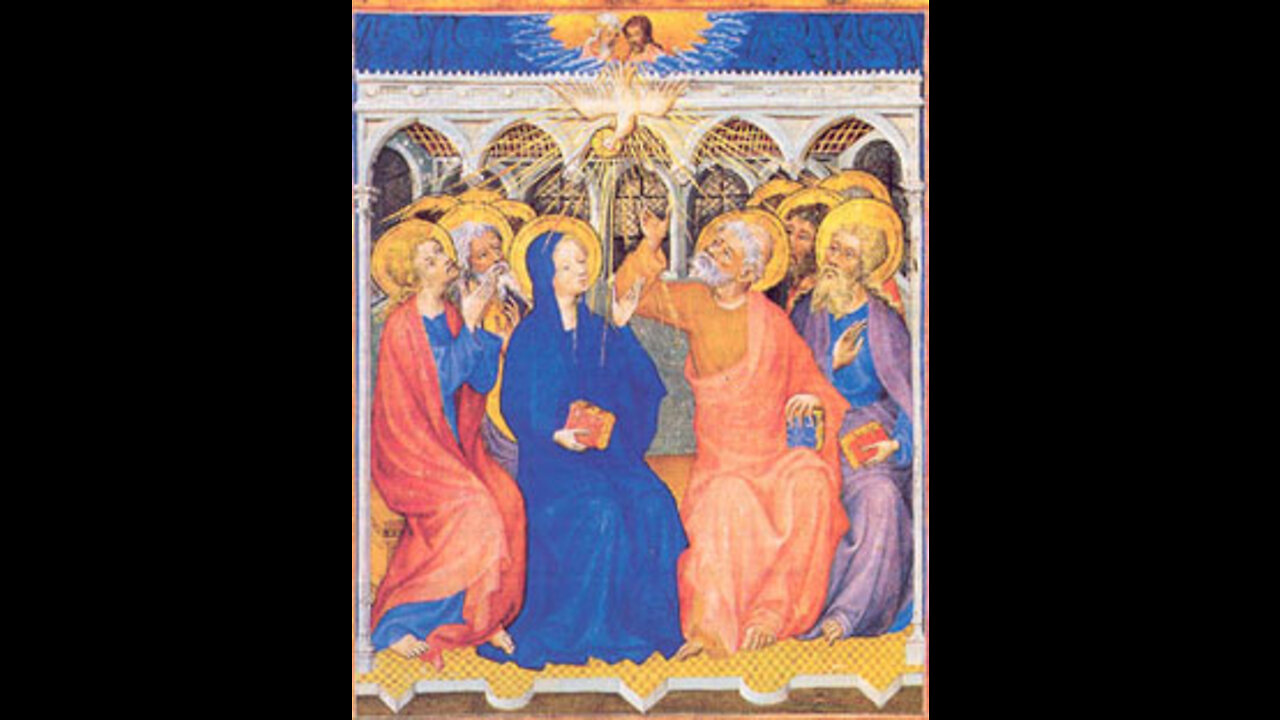Premium Only Content

Confirmation Pre Constantine Be Sealed with the Gift of the Holy Spirit III
V Pentecost
The Coming of the Holy Spirit
2 When the day of Pentecost had come, they were all together in one place. 2 And suddenly a sound came from heaven like the rush of a mighty wind, and it filled all the house where they were sitting. 3 And there appeared to them tongues as of fire, distributed and resting on each one of them. 4 And they were all filled with the Holy Spirit and began to speak in other tongues, as the Spirit gave them utterance.
VI NT Epistles, difference between Baptism & Confirmation
Acts 8:14-17,
that after the Samaritan converts had been baptized by Philip the deacon, the Apostles “sent unto them Peter and John, who, when they were come, prayed for them, that they might receive the Holy Ghost; for he was not yet come upon any of them, but they were only baptized in the name of the Lord Jesus; then they laid their hands upon them, and they received the Holy Ghost“.
Acts 19:1-6 St. Paul “came to Ephesus, and found certain disciples; and he said to them: Have you received the Holy Ghost since ye believed? But they said to him: We have not so much as heard whether there be a Holy Ghost. And he said: In what then were you baptized? Who said: In John’s baptism. Then Paul said: John baptized the people with the baptism of penance…. Having heard these things, they were baptized in the name of the Lord Jesus. And when Paul had imposed his hands on them, the Holy Ghost came upon them, and they spoke with tongues and prophesied”.
Two clear instances of baptized people receiving the Holy Ghost by a defined rite through the imposition of hands.
A striking passage, which was made much use of by the Fathers is that of St. Paul: “He that confirmeth us with you in Christ, and hath anointed us, is God, who also hath sealed us, and given us the pledge of the Spirit in our hearts” (II Cor., i, 20, 21).
The sacrament of confirmation is found in Bible passages such as Acts 8:14–17, 9:17, 19:6, and Hebrews 6:2, which speak of a laying on of hands for the purpose of bestowing the Holy Spirit.
Hebrews 6:2 is especially important because it is not a narrative account of how confirmation was given and, thus, cannot be dismissed by those who reject the sacrament as something unique to the apostolic age. In fact, the passage refers to confirmation as one of Christianity’s basic teachings, which is to be expected since confirmation, like baptism, is a sacrament of initiation into the Christian life.
We read: "Therefore let us leave the elementary teachings of Christ and go on to maturity, not laying again the foundation of repentance from acts that lead to death, and of faith in God, instruction about baptisms, the laying on of hands, the resurrection of the dead, and eternal judgment" (Heb. 6:1–2). Note other times of hand laying would be healing and ordination. These do not fit the context of the text.
Notice how in this passage we are walked through the successive stages of the Christian journey—repentance, faith, baptism, confirmation, resurrection, and judgment. This passage encapsulates the Christian’s journey toward heaven and gives what theologians call the order of salvation or the ordo salutis. It well qualifies as "the elementary teachings" of the Christian faith.
The laying on of hands mentioned in the passage must be confirmation: The other kinds of the imposition of hands (for ordination and for healing) are not done to each and every Christian and scarcely qualify as part of the order of salvation.
Form & Matter
West laying on of hands in the beginning, bishop, soon incorporation of chrism oil.
East Chrism oil.
VII Apostolic & Patristic Practices I found an excellent link. I shall reference from at length as we have seen most of the same Fathers in the Eucharist and Baptismal studies.
NB: Confirmation was given to a person immediately after Baptism as the Church was till small and the bishop was able to preform all of the sacraments. In the Eastern Church, this is still the case. As the Church grew, Post Constantine, this was no longer feasible and priests were delegated the privilege.
-
 11:05
11:05
Fides et Ratio
1 year agoIgnatius’ Rules for Discernment Journey to God VII
543 -
 2:18:15
2:18:15
Side Scrollers Podcast
22 hours agoBlizzard BANS Player for Saying “n00b” + Cracker Barrel Ends PRIDE Funding + MORE | Side Scrollers
61.7K27 -
 19:54
19:54
GritsGG
17 hours agoMAX SR Win on Warzone! Ranked Tips for Loadout & Landing Spot!
22.1K -
 44:41
44:41
Inverted World Live
16 hours agoPolitical Violence in Minnesota w/ AK Kamara
179K20 -
 6:29:40
6:29:40
SpartakusLIVE
16 hours ago#1 Massive MEAT-HEAD can't stop WINNING, can't stop FLEXING
96.6K -
 5:09:25
5:09:25
Drew Hernandez
17 hours agoGIDEON AI THREAT DETECTION SOFTWARE PUSH & NEW EPSTEIN EMAIL LEAK?
65.8K30 -
 2:03:51
2:03:51
TimcastIRL
13 hours agoTrans Minneapolis Shooter BLAMED Massacre On Mom & Gender Transition | Timcast IRL
212K409 -
 47:29
47:29
Man in America
20 hours agoIT DOESN'T ADD UP: The Trans Shooter's Story Is FULL of Holes
74.7K99 -
 3:59:36
3:59:36
StevieTLIVE
13 hours agoFriday Night Warzone HYPE
51.8K2 -
 3:47:10
3:47:10
SynthTrax & DJ Cheezus Livestreams
1 day agoFriday Night Synthwave 80s 90s Electronica and more DJ MIX Livestream Michael Jackson / AI Art Compilation Edition
58.3K2